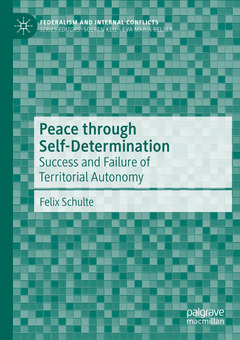Peace through Self-Determination, 1st ed. 2020 Success and Failure of Territorial Autonomy Federalism and Internal Conflicts Series
Auteur : Schulte Felix

Develops a multidimensional and highly precise concept of territorial autonomy
Provides an in-depth insight into 19 conflict regulating territorial autonomies worldwide
Bridges the gap between in-depth case studies and the generalizations of large-n studies
Date de parution : 01-2021
Ouvrage de 171 p.
14.8x21 cm
Disponible chez l'éditeur (délai d'approvisionnement : 15 jours).
Prix indicatif 52,74 €
Ajouter au panierDate de parution : 01-2020
Ouvrage de 171 p.
14.8x21 cm
Disponible chez l'éditeur (délai d'approvisionnement : 15 jours).
Prix indicatif 73,84 €
Ajouter au panierThème de Peace through Self-Determination :
Mots-clés :
territorial autonomy; ethnic self-determination conflicts; ethnic identity; autonomy success and failure; Social Identity Theory; self-rule; South Tyrol; Chittagong Hill Tracts; post-conflict institutional engineering; degree of self-determination; successful autonomy; mutual recognition; Catalonia; international integration of autonomous regions; external recognition



